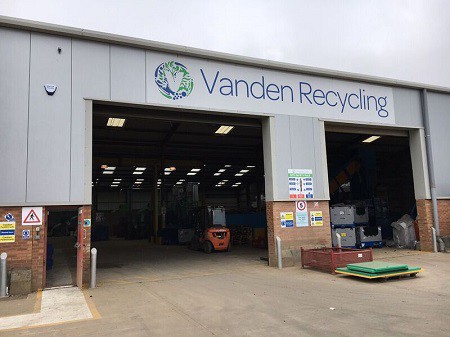The facility, which processes post-industrial plastics including PET, PP and HDPE, is expected to cease operations by late October.
Managing Director Kevin Thompson said the decision followed “careful consideration”, noting that the Whittlesey site “has been a small but important part of our operations” but did not offer the scale required to meet the company’s long-term objectives.
Thompson added: “By redirecting resources to our core trading business, we can concentrate on the areas that offer the greatest growth potential and provide improved service to our key clients.”
The sale of the processing plant and equipment from the facility is being managed by Benchmark International.
Challenging conditions
Vanden highlighted the difficult operating environment for rigid plastics recycling, with higher costs for energy, transport and labour coinciding with sluggish end markets.
According to the company, sustained low values for recycled polymers, driven by the lower cost of virgin plastic and the “failure of a regulatory environment that incentivises the use of recycled material”, have further pressured the economics of running the facility.
The company has already reduced staffing levels at Whittlesey as it winds down operations and said it is working with suppliers to ensure alternative arrangements are in place for material.
Thompson commented: “We remain committed to delivering excellent service and strengthening our partnerships through our global trade offering.”
Plastics sector under pressure
Vanden’s decision comes amid wider pressure in the UK and European plastics recycling market.
Plastics Recyclers Europe (PRE) warned this week (27 August 2025) that the sector is facing “imminent collapse”, pointing to a combination of falling demand, rising costs and regulatory pressures that continue to force facilities out of business.
In the UK, several closures have already taken place.
Viridor shut its Rochester plastics recycling facility earlier this summer, following the closure of its Avonmouth site in December 2024.
Biffa also confirmed the closure of its Sunderland plant in July, which had capacity to process 39,000 tonnes of HDPE and PP each year.
The wider market has been subdued in August, with trading volumes and prices following seasonal trends, which have been compounded by the facility closures.
Prices for certain grades have softened due to an abundance of available material, particularly PET, which typically sees weaker demand during the summer months.
Across Europe, recyclers are also contending with low virgin polymer prices, which are putting margins under further strain.
\\r\\n\\r\\n\\r\\n\\r\\n\\r\\n\\r\\n\\r\\n\\r\\n\\r\\n\\r\\n\\r\\n\\r\\n\\r\\n\”,\”body\”:\”\\r\\n\\r\\n\”,\”footer\”:\”\”},\”strict\”:{\”header\”:\”\”,\”body\”:\”\”,\”footer\”:\”\”},\”advanced\”:{\”header\”:\”\”,\”body\”:\”\”,\”footer\”:\”\”},\”performance\”:{\”header\”:\”\”,\”body\”:\”\”,\”footer\”:\”\”},\”preference\”:{\”header\”:\”\”,\”body\”:\”\”,\”footer\”:\”\”}}”,”gdpr_scor”:”true”,”wp_lang”:””,”wp_consent_api”:”false”,”gdpr_nonce”:”de155d0f64″,”gdpr_consent_version”:”1″,”gdpr_uvid”:”d418b3b21e6c4619684fe1314c8bd90b”,”stats_enabled”:””,”gdpr_aos_hide”:”false”,”consent_log_enabled”:””,”enable_on_scroll”:”false”};
/* ]]> */
